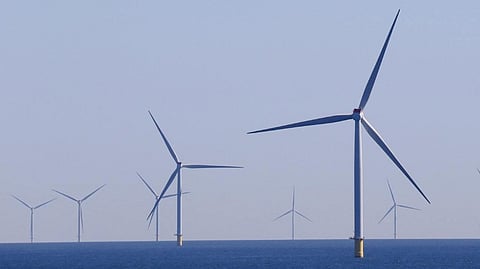US "clean energy" boom fades as Trump cuts subsidies
Major "clean energy" investments are now in question after Republicans agreed earlier this month to quickly end US subsidies for solar and wind power as part of their budget megabill, and as the White House directed agencies to tighten the rules on who can claim the incentives that remain.
This marks a policy U-turn since President Donald Trump’s return to office that project developers, manufacturers and analysts say will slash installations of renewable energy over the coming decade.
Solar and wind installations could be 17 per cent and 20 per cent lower than previously forecast over the next decade because of the moves, according to research firm Wood Mackenzie.
The White House did not respond to a request for comment.
The Trump administration has defended its moves to end support for "clean energy" by arguing the rapid adoption of solar and wind power has created instability in the grid and raised consumer prices.
Power industry representatives, however, have said all new generation projects need to be encouraged to meet rising US demand, including both those driven by renewables and fossil fuels.
Consulting firm ICF projects that US electricity demand will grow by 25 per cent by 2030, driven by increased AI and cloud computing, a major challenge for the power industry after decades of stagnation. The REPEAT Project, a collaboration between Princeton University and Evolved Energy Research, projects a two per cent annual increase in electricity demand.
The key provision in the new law is the accelerated phase-out of 30 per cent tax credits for wind and solar projects: it requires projects to begin construction within a year or enter service by the end of 2027 to qualify for the credits. Previously the credits were available through 2032.
Now some project developers are scrambling to get projects done while the US incentives are still accessible. But even that strategy has become risky, developers said.
Days after signing the law, Trump directed the Treasury Department to review the definition of “beginning of construction.” A revision to those rules could overturn a long-standing practice giving developers four years to claim tax credits after spending just five per cent of project costs. Treasury was given 45 days to draft new rules.
Five solar manufacturing companies, T1 Energy, Imperial Star Solar, SEG Solar, Solx and ES Foundry, said they are concerned about the new law's impact on future demand, but that they have not changed their investment plans.
The policy changes have also injected fresh doubt about the fate of the nation's pipeline of offshore wind projects, which depend heavily on tax credits to bring down costs. According to Wood Mackenzie, projects that have yet to start construction or make final investment decisions are unlikely to proceed.
Two such projects, which are fully permitted, include a 300-megawatt project by developer US Wind off the coast of Maryland and Iberdrola’s 791 MW New England Wind off the coast of Massachusetts.
Neither company responded to requests for comment.
(Reporting by Nichola Groom; editing by Richard Valdmanis and Marguerita Choy)


